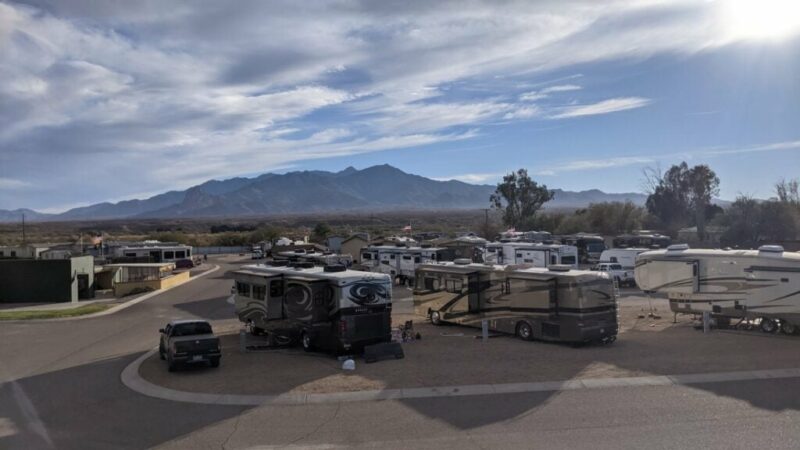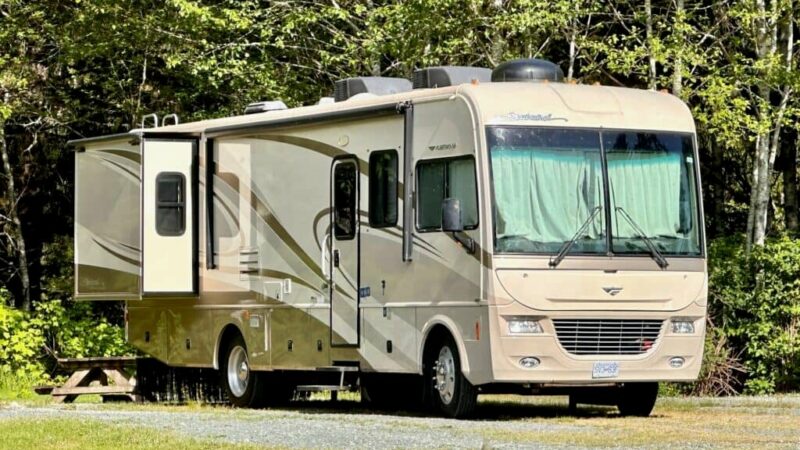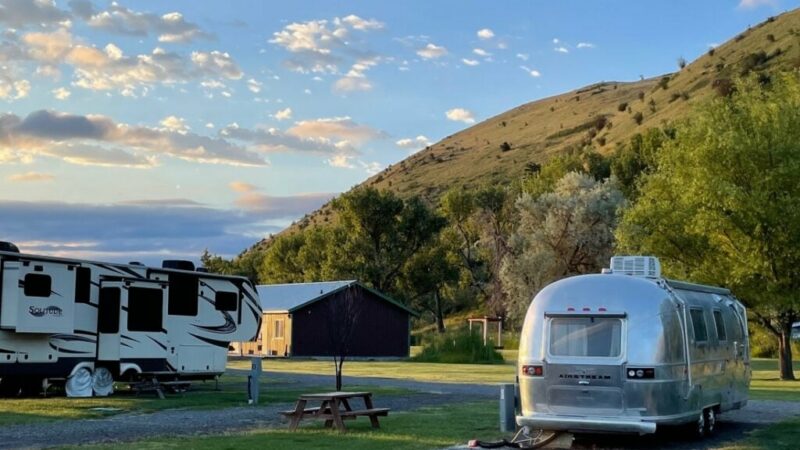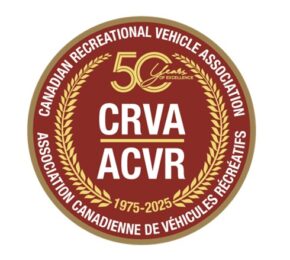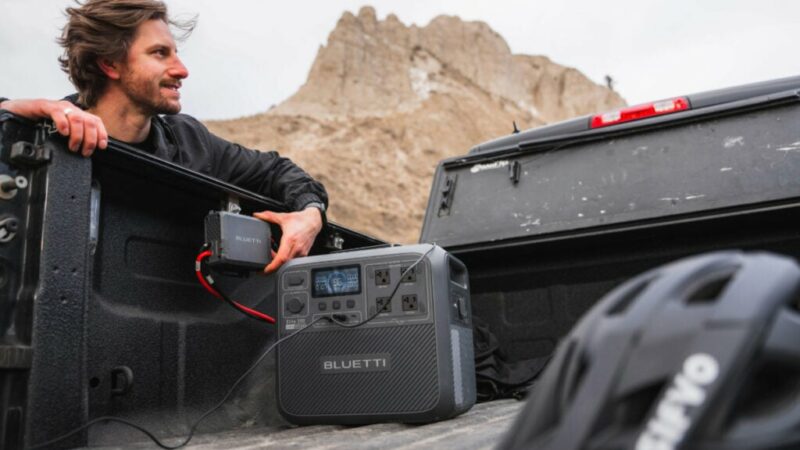Touring With a “Toad”
Tips for towing a vehicle behind a motorhome
By Garth W. Cane
Many RV’ers who own larger motorhomes like to tow a car so that they can go sightseeing, shopping, and visiting without having to drive their motorhome through narrow streets and mall parking lots. The car can be like a spare tire if the motorhome breaks down and you need to go for help.
To some, it may seem like a great idea to use the towed vehicle as a cargo carrier – but you should not use the car as a packhorse to carry your extra gear! You must stay under the Gross Combined Weight Rating of the motorhome for safety, and you have to have an auxiliary braking device installed in the car so that the motorhome brakes are not overloaded.
Many cars can be flat-towed with four wheels down, others can be transported with their drive wheels on a dolly, and some need to be on a flatbed trailer with all wheels off the ground. Some RV’ers who drive bus conversions tow their classic cars in an enclosed trailer to protect them. Another very popular choice is the “toy hauler” RV that allows a small vehicle to be driven into a garage-like area in the rear of a specially designed class A motorhome.
When you use a dolly, the front wheels are driven up onto a swivel platform and then tied down securely with canvas straps. This is relatively simple, but time consuming – I have yet to be able to load a car on a dolly and tie it down in less than 20 minutes – it takes about the same amount of time to unload it. If I have to turn the motorhome around because of a blocked street, it can take close to an hour to turn everything around. In the overall perspective, the dolly is great for owners who trade their cars often and do not want to install a base plate or lubrication pump on the vehicle. The cost of a base plate and tow bar is often less than the cost of a dolly. Most AWD (all-wheel-drive) and CVT (continuously variable transmission) vehicles cannot be towed on a dolly and must be carried on a flatbed trailer. My problem with a flatbed trailer is that there is not enough room at the campsite for the motorhome, the trailer and car, so the trailer has to be towed out of the way to a storage area.
Each time we stop when I am towing a car with four wheels on the ground, I start the engine and run the transmission through the gears. I also check the heat of the tires and hubs with an infrared thermometer to be sure that none of the tires are overheating from a sticking brake. Inexpensive infrared temperature meters are available – most of these thermometers are designed to check on the meat cooking on your barbecue.
Remember that you cannot back up with a vehicle on a tow dolly or one being towed four wheels down, so plan your travels carefully. Turning in soft sandy ground can cause the front wheels to lock up in an extreme turn position, placing a great deal of stress on the frame of the car.
Tow Bar Tips…
When I hook up the arms of a tow bar, I usually back up the car a short distance until one of the bars locks up. Then I turn the steering wheel towards the shortest arm so that when the motorhome pulls ahead, it will force the other arm to lock-up. After connecting the electrical cord, safety chains, and breakaway cable, I always turn on the four way flashers of the motorhome so that I can check to see that all the turn signals and brake lights on the towed vehicle are working properly, and I also make sure that the emergency brake lever is not engaged. Make sure that you have shifted your transmission into towing mode, shut off the engine, and then check your auxiliary braking system to be sure that it is adjusted. (Our Brake Buddy does an automatic check and bleeds the vacuum from the regular brakes when you touch the start button on the control panel. If you do not bleed the vacuum, you may experience extra wear on your front brake pads.)
When I arrive at a campsite, I always stop both vehicles in a straight line on the road before disconnecting the car and driving the motorhome onto the campsite. This removes any side pressure on the hitch pins to allow you to remove them easily. When you tow a four-wheel-drive, like I do, remember that the transfer case is in neutral so the four wheels are free to rotate. If you disconnect the tow bar before returning the transfer case to normal, the car could roll away.
Tow Bar Tips
Over the years, we have looked at several smaller vehicles that can be flat-towed behind a motorhome. In general, most manual transmission cars can be towed in neutral with four wheels on the ground. Four-Wheel-Drive vehicles can be towed with the transmission in park and the transfer case in neutral. Some 4WDs like the Ford Explorer do not have a neutral in their transfer case so they have to have a neutral tow kit installed. For other vehicles that have an automatic transmission, the addition of an auxiliary lube pump or a drive shaft disconnect will allow many to be flat towed. Go to https://www.curtmfg.com/flat-towing/learn-more to see what vehicles can be “flat towed”.
Before purchasing a new vehicle to tow behind your motorhome, it is wise to look at the owner’s manual under “recreational towing” as specifications can change from the time of introduction of a model to a later version.
If a vehicle’s transmission has its lubrication pump on the output shaft, then the oil pump is driven by the wheels and the flow will keep the gears cool as you tow your automatic. If the pump is on the input shaft (the one connecting the motor to the transmission) then it cannot be towed without a lube pump or drive shaft disconnect. Most RV’ers prefer to tow vehicles that have automatic transmissions.
There are many new and recent model year vehicles that can be towed behind a motorhome.
Here is a quick guide to some of the vehicles that are popular for this purpose.
Buick
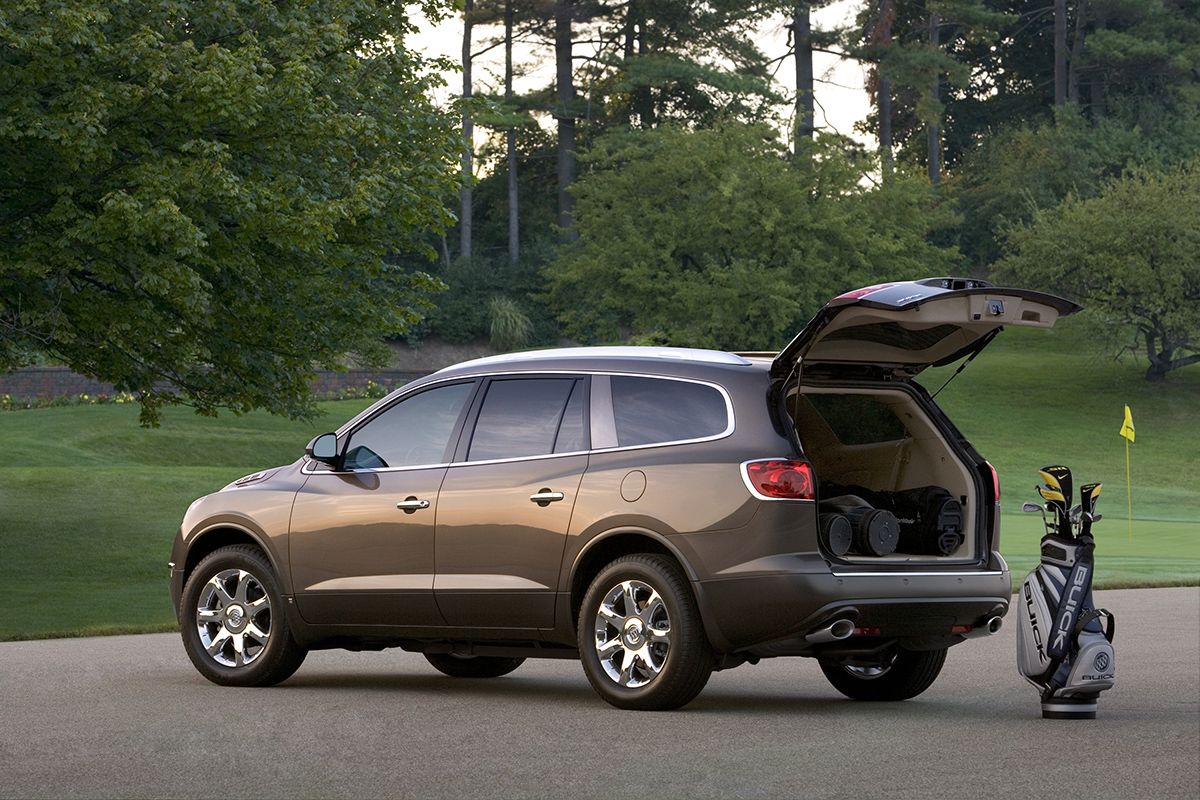
Both the Buick Enclave FWD and AWD models with automatic transmissions can be flat-towed at speeds up to 65 mph and no distance limits. This vehicle is more suitable for towing behind large motorhomes as it weighs close to 5000 pounds.
Chrysler
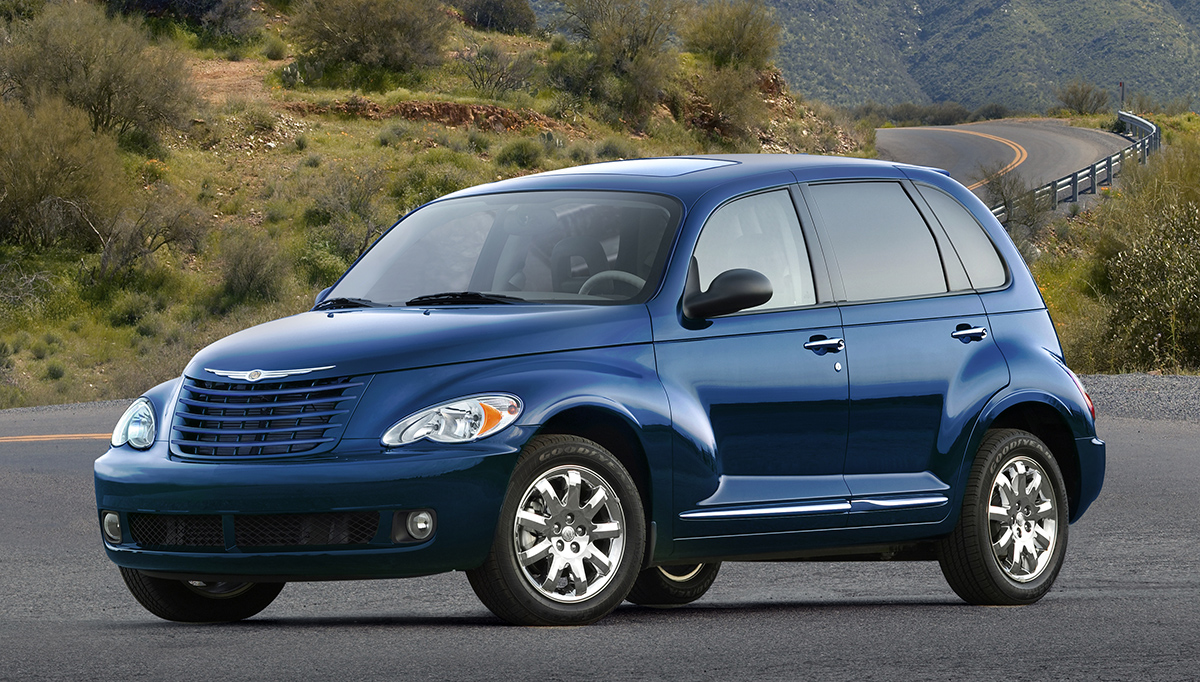
Chrysler’s PT Cruiser with the manual transmission is a classic, and a nice vehicle to tow. It was scheduled for retirement in 2010 but popular demand brought it back, and you can still find a great deal on a gently used PT Cruiser.
The front-wheel-drive Jeep Compass is a good vehicle to tow as long as it has the 5-speed manual transmission installed. If your Patriot has a 4WD or FWD with a 5-speed manual transmission it will be OK to tow it behind the motorhome. We tow a Jeep Liberty behind our motorhome with the transfer case in neutral and the transmission in park. Jeeps like the Wrangler with manual transmissions have been towed in neutral for many years with no problems for people who like to explore the backcountry hills and valleys.
Ford
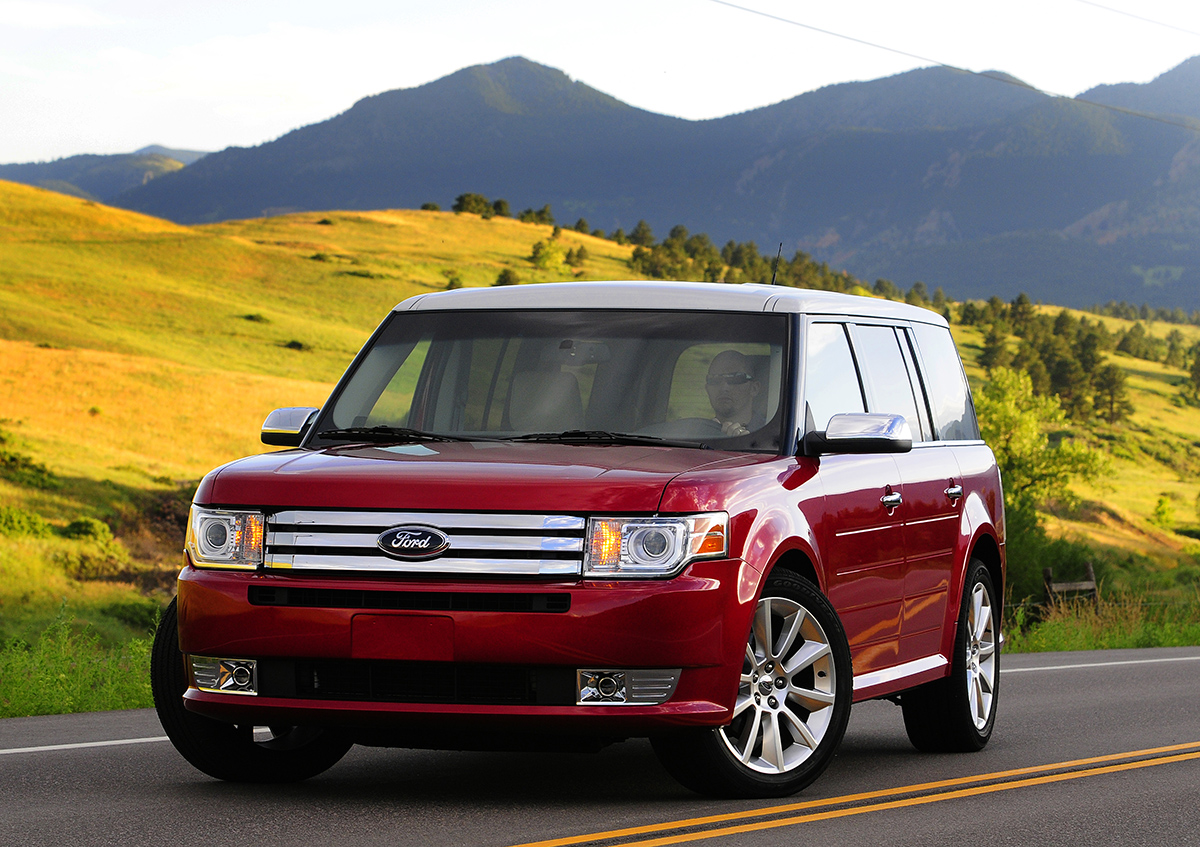
The Ford Edge with FWD or AWD and automatic transmissions can be flat-towed. We tested a Ford Focus manual transmission model and it was an excellent car to tow. The Ford Fusion can be towed, but only when equipped with a manual transmission. The Ford Flex with either AWD or FWD is only available with an automatic transmission and can be towed flat. This is the re-incarnation of the station wagon that many of us loved to drive when we had children living at home. We also tested the Mazda Tribute, which is a twin of the Ford Escape. This vehicle is available in both 4WD and FWD. The 4WD is towable in automatic, but the FWD needs to be a manual transmission. The hybrid version is also towable with an automatic transmission. We have met several RV’ers who tow a small truck and carry a golf cart in the truck’s load bed for use at rallies.
General Motors
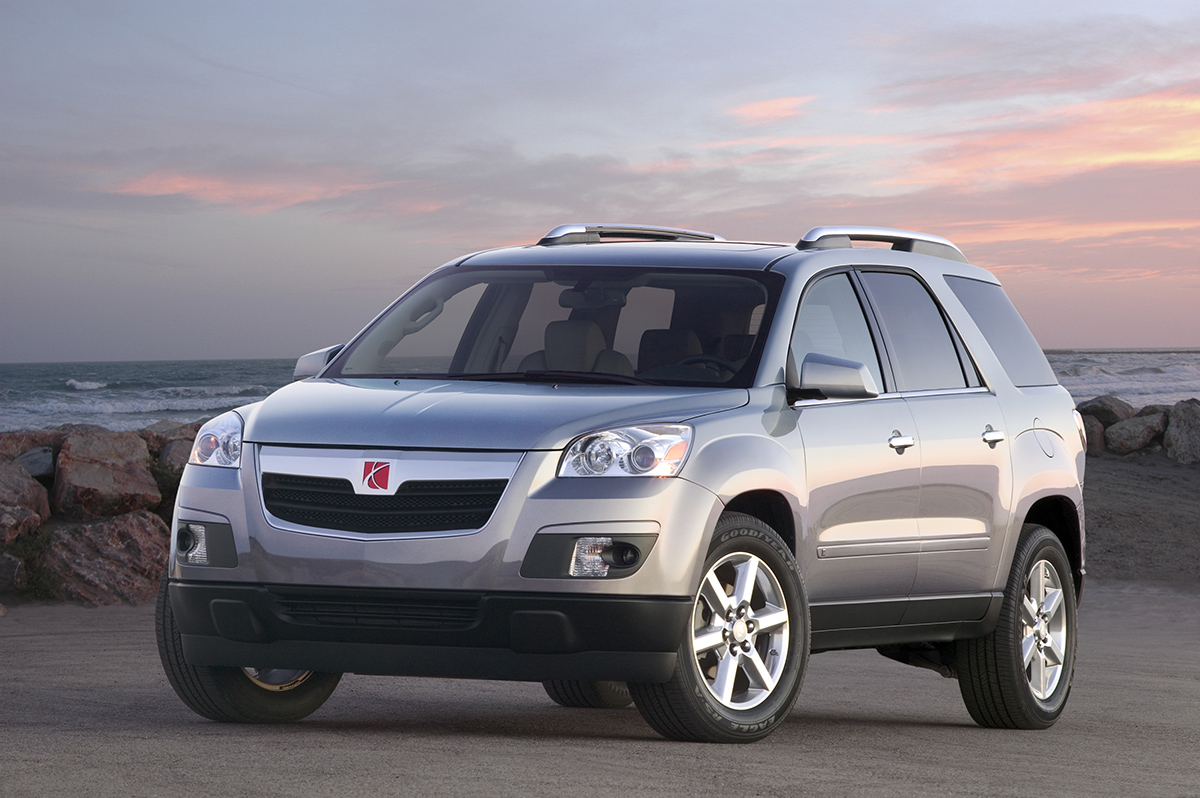
While they are no longer in production, you can get a super deal on a gently used Saturn – many RVers have towed Saturn cars with the automatic transmission for years – including the Aura, Outlook, and Vue. Even the Hybrid Aura and Vue are listed as towable in neutral.
Chevrolet Malibu, Cobalt, Equinox, Traverse, and HHR also have the same 4T45 transmission. GM recommends the same shifting procedure as Honda before towing to be certain the transmission is truly in neutral. RV’ers with a higher GCWR on their motorhome can tow any of the Chevy or GMC 4WD trucks.
Customers have to follow the recommendation in the Aveo’s operator’s manual for towing, i.e. put transmission in neutral with front wheels on the dolly, steering wheel clamped and vehicle tied down. This towing recommendation is to protect the transmission from load generated from the potentially small vehicle movement on the dolly during acceleration / deceleration. The load is taken up by the tie downs when the transmission is in neutral and wheels are free to rotate.
Honda
Over the years, many RV’ers have towed Honda cars even though the manufacturer did not officially sanction this use. The Honda Fit and the CRV are the first models that can be towed, according to the manufacturer, after shifting through all the gears and then shifting from drive to neutral before shutting down the engine.
Hyundai
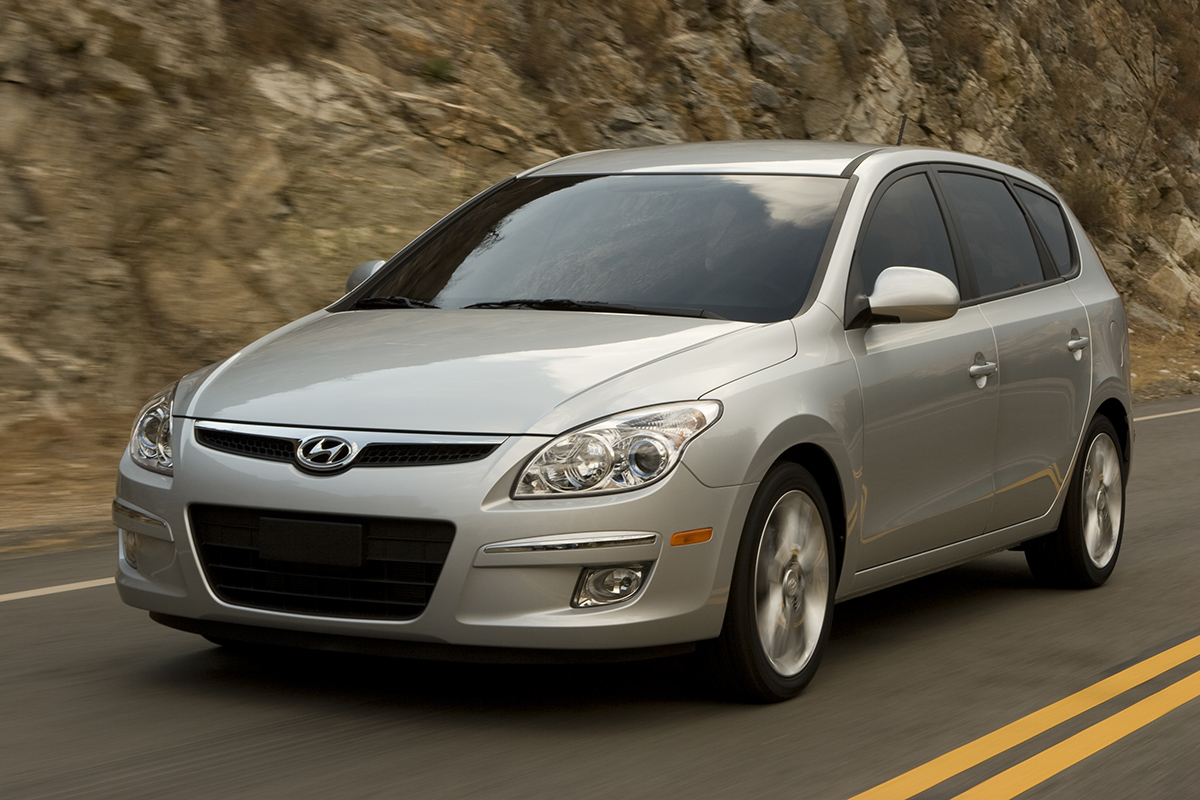
The Hyundai Accent and Elantra are less than 2700 pounds and both can be towed when equipped with manual transmissions. These small cars are excellent for trips from the campground. The sister company Kia provided us with a Magentis for our test. This FWD manual transmission vehicle weighed in at 2400 pounds.
Kia
The Kia Magentis is towable with a 175 horsepower 2.4L 5-speed manual transmission front-wheel-drive weighing 3157 pounds. The newer Kia Soul looks a little boxy, but it would make a good tow-behind car. It rides on 15″ wheels with a 1.6L engine, but with a 2.0L engine it can have 16″ wheels and more horsepower, and is towable with the 5-speed manual transmission. The 1.6L unit boasts 45 mpg on the highway and 37 mpg in the city.
Nissan
The Nissan Versa and Xterra can be flat-towed with a manual transmission, but the engine must be idled in neutral to circulate the fluids after towing 500 miles.
Pontiac
The Pontiac G5 with front wheel drive and auto transmission can be flat-towed. The G6 with a 3.9L V6 and 4-speed auto transmission cannot be towed four wheels down. The Torrent GXP front-wheel drive with 6-speed manual transmission can be towed. If you have a Vibe, it can be towed with a manual transmission only.
Suzuki
Suzuki’s SX4 manual makes a great tow-behind vehicle with great headroom inside as it is lightweight and fun to drive. For more elegance, the Grand Vitara with the 4-mode 4WD will take you on off-road excursions in style.
Subaru
Subaru’s all-wheel drive Forester, Imprezza, and Legacy vehicles are towable if they have a manual transmission.
Mercedes-Benz
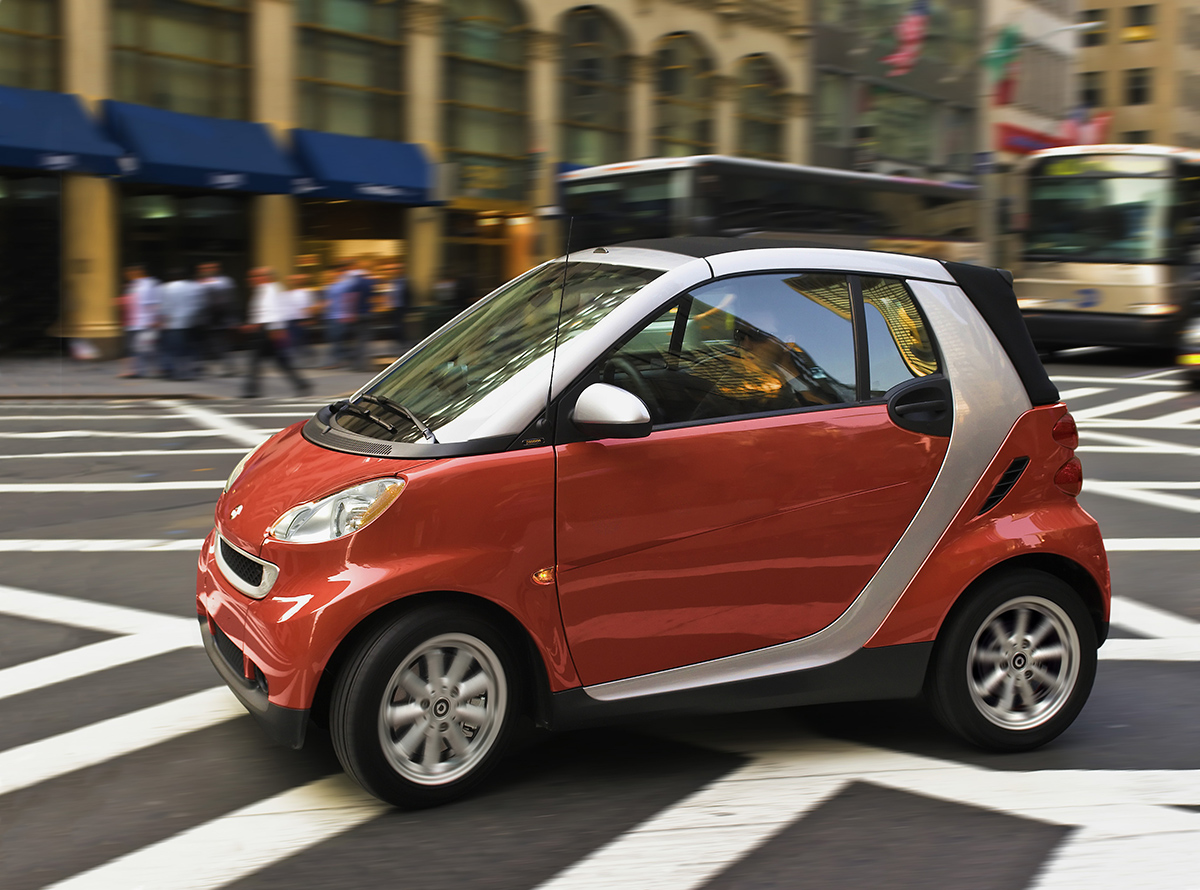
The Mercedes-Benz Smart-for-Two is a popular choice among the compact towable cars. With a standard transmission, it is amazing how stable this ultra-small vehicle feels even when driving on the highway and being passed by large trucks. The manual transmission has an automated shifting system that allows the driver to select either manual or automatic shifting. It must be in manual to tow. The proper base plate from Blue Ox is BX1987 and the wiring kit is BX8848.
For an excellent guide to flat-towing cars and trucks behind your motorhome, please visit the Blue Ox website at https://www.blueox.com/recreational-tow-bars/
Toyota
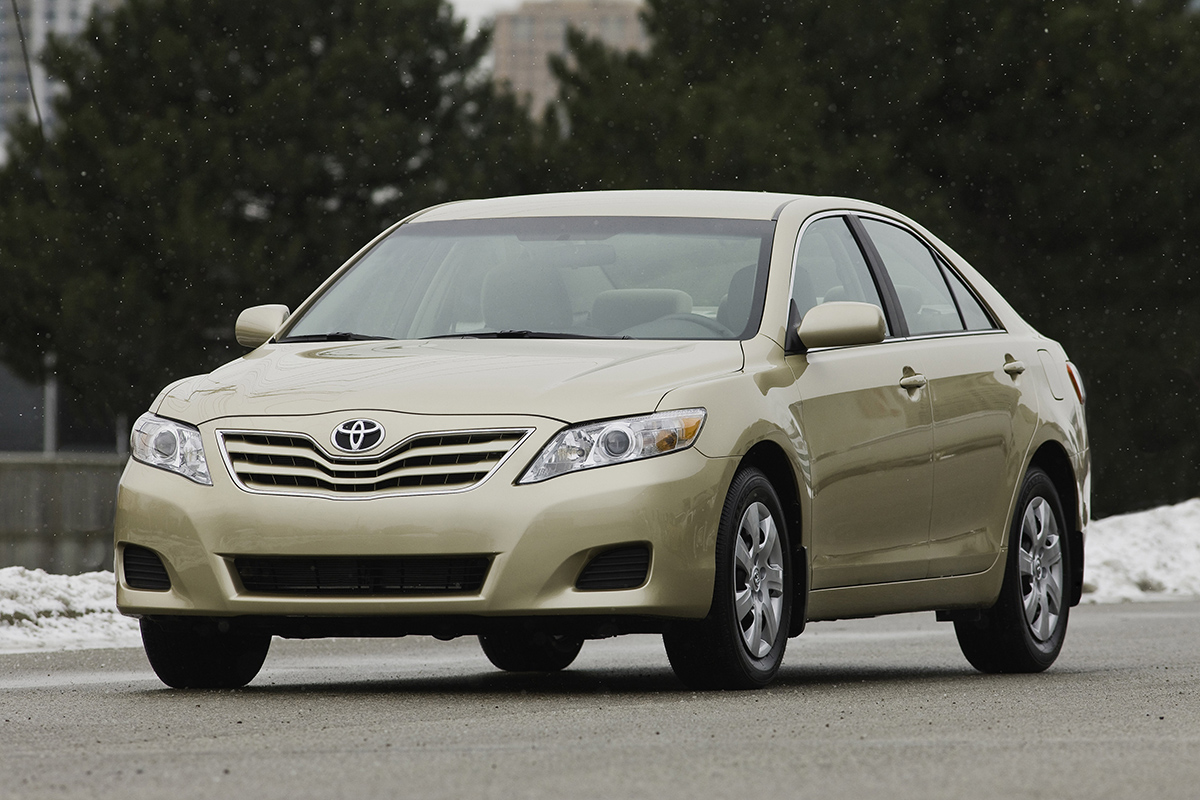
If you have a manual transmission in your Toyota Camry, Corolla, Matrix, or Yaris, they can be flat-towed with no distance limits. I enjoyed towing a Toyota Venza on a recent trip. The FWD can be towed on a dolly, but the AWD needs to be up on a flatbed trailer.
Towing Accessories
Roadmaster makes an automatic battery disconnect that prevents your battery from being discharged by your supplemental brake system or other aftermarket accessories while you are towing.
We use a set of isolation diodes from Blue Ox so the rear lights on our Liberty do not interfere with the on-board computer during towing. Some RV’ers use an extra set of bulbs mounted in the tail light lenses so that they are not interfering with the standard lighting system. We often see RV’ers with a light bar mounted to the roof or trunk of their car powered by a cable attached to the trailer connector of their motorhome.
When using a tow bar, it should be level to prevent the car from trying to ride up or push down when you come to a sudden stop. This can exert a great deal of pressure that can crack welds on the hitch receiver of the motorhome. We often see cars with leather bras, stone barriers or underskirts installed to prevent paint chips from gravel thrown up by the motorhome’s rear wheels.
When you have a properly equipped vehicle to tow behind your motorhome, your flexibility of travel increases, and your enjoyment of access to each destination is better. Narrow, twisting mountain roads, such as the ones found at National monuments and many campgrounds, are easier to manoeuvre with a smaller vehicle. When you need to leave the campground to pick up essential supplies, you will not have to disconnect your electrical cords, and hoses.
Useful links for motorhome owners planning on towing a car…
Cargo trailers
- Haulmark www.haulmark.com
- Show Hauler www.showhauler.com
- Pace www.paceamerican.com
- Wells Cargo www.wellscargo.com
Tow dollies, flatbed trailers
- Mastertow www.mastertow.com
- Demco www.demco-products.com
- Trailex www.trailex.com
Base plates, tow bars
- Blue Ox www.blueox.us
- Demco www.demco-products.com
- Roadmaster www.roadmasterinc.com
Braking systems
- Patriot https://www.blueox.com/patriot-flat-tow-brake-system/
- Brake buddy www.brakebuddy.com
- Roadmaster www.roadmasterinc.com


